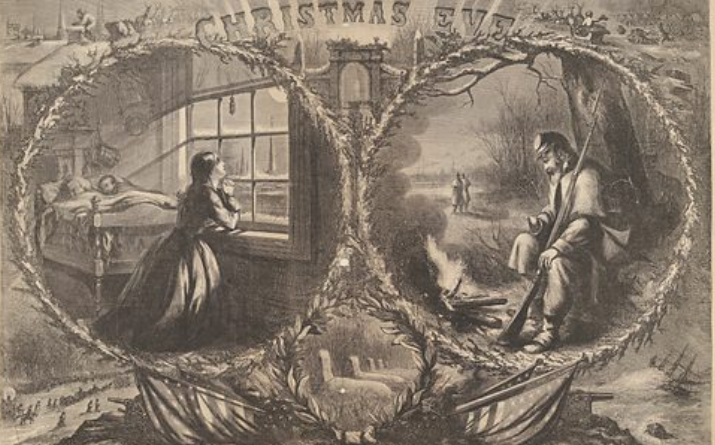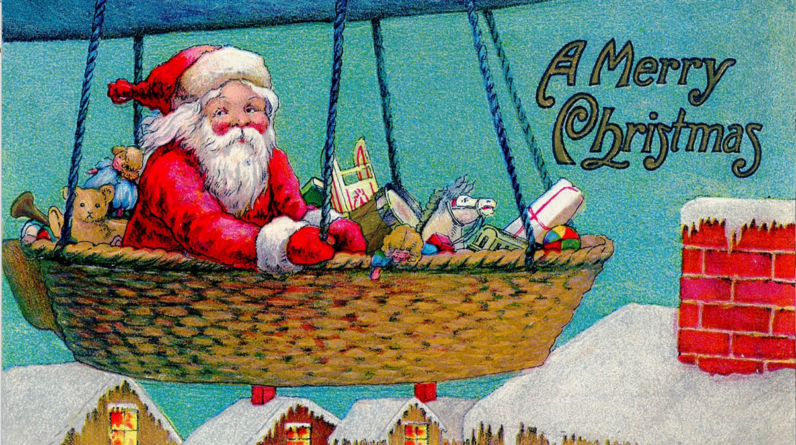
History of Christmas
The History of Christmas includes the holiday tree. Stockings that hang. Holiday cards. Caroling. Saint Nick. Giving gifts. “Egg Nog.” The holiday log.
Do you know the origins of these customs? Many people assume these customs have simply “always existed” and that what we do as a country on December 24th each year has always been the same. Do you think we just “made” them ourselves, or something else?
If so, you clearly don’t understand the origins of Christmas customs. Have you ever questioned why we act in certain ways when the weather becomes cool and the snow starts to fall?
Every Christmas custom we are aware of today exists for a purpose. And not all of them could be what you expect!
Christmas Traditions
You’ll learn why several Christmas customs are observed each year and their specific origins across the pages of this book. Here’s a secret that you might not be aware of. Many of the Christmas customs we follow to observe our national holiday weren’t even developed in our nation! Hard to imagine? Well, it is absolutely, categorically F-A-C-T.
You know what else? In our nation, Christmas almost didn’t exist!
What????!
Yes, that’s correct. In reality, because of the Holiday’s roots, some of the earliest “Powers That Be” did not believe in it.
You could be asking yourself, “How is that possible? That most definitely isn’t the situation. This Sacred Holiday Must Be Misunderstood, Someone Must Know! “.
Someone IS ignorant about this festival, I can tell you of that. And you might be the one. Or someone you know who is unaware of the true origins of Christmas and the customs that surround this holiest of occasions.
Wouldn’t it be interesting to learn how the Christmas holiday came to be celebrated the way it is today and how it all began?
You will read about the entire incident, I suppose. In the present moment, on these very pages. So relax, pour yourself a cup of your favorite holiday beverage, and get ready to learn about the traditions and history of the American Christmas!
A Happy Holiday Season to You!
Christmas: The Starting Point
Christmas. Simply hearing the term makes us happy and kind to one another. A day when Heaven bestowed to us the greatest gift in the history of the earth.
What comes to mind right away when you hear the word “Christmas”? When was Jesus Christ born? Yes, according to tradition, that is the cause for the Christmas holiday and celebration. Christ’s birth, or his birth. For heavens’ sake, I say! The word itself includes his name!
But is it actually where the Christmas holiday season starts? Or is there another location? Would you think that it is actually rooted elsewhere?
However, let’s go back in time to the period before to the birth of Jesus Christ to see if we can’t make sense of this…
Winter Celebrations Before Christ
A group of people celebrated what they named “The Winter Solstice” centuries before Christ was born. Early Europeans would assemble for this festival to celebrate the end of the harshest part of the winter season and the fact that they had made it through yet another long, chilly winter. Additionally, people may start taking advantage of longer days. This was a celebration of light itself, to put it another way. as well as life.
This annual celebration of life and light would occur on or around December 21 or 22. Additionally, it might happen any time between December 20 and December 23 depending on the calendar shift. Would you agree that it is getting close to the period when we usually celebrate Christmas?
Perfect Time to Party
Indeed, the end of December was a perfect time for celebrations throughout the countryside of Europe, in large part because cattle were butchered so they wouldn’t need to be fed over the winter. And for many individuals, this would be one of the few opportunities they would have all year to eat fresh meat.
In addition to this, the majority of produced beverages enjoyed throughout the year, such beer and wine, had completed the fermentation cycle and were prepared for consumption. Burgers with beer? I don’t know what else to call that if it isn’t a party now.
One final point to make is that many people in Germany at this period would honor the paganism god Oden. Many Germans who revered this god in the distant past were terrified of him. They did this because they thought Oden would conduct “nightly rounds” of his people to determine who would prosper and who would, well, not. As a result, many Germans would spend their time indoors with their families.
Many Nations Celebrated
To be honest, this time of year was a time of celebration for many nations. not simply celebrating Oden and the Winter Solstice. Later, the deity of agriculture, Saturnalia, was worshipped by the Romans. Identify the date of his birthday. 25 December. And you know how far flung the Roman Empire was. The Known World, is all !
As you can see, there are many parallels between how we celebrate Christmas and other holidays. Small, maybe, but nonetheless comparable.
So, even before the birth of Jesus Christ, there were gatherings of people in many nations who would celebrate at a particular period during the winter.
Birth of Jesus Christ
Many people hold that Jesus Christ was born on or around December 25th based on the words of the Holy Bible. His “birthday” would be today.
Was it really his birthday, though?
In truth, nobody knows the definitive response. We can only presume that what we are reading is the real deal, delivered to us directly from God. For Jesus’ era, there are no “official” birth and death records that we can go back and review to determine the precise date of His birth.
There is some indication, nevertheless, that His birth may have really taken place earlier in the year than during the winter.
The Bible’s testimony indicates that there were shepherds in the fields when Jesus was born, according to that evidence.
What Do We Know?
However, if that were the case, He would not have been born in December because shepherds wouldn’t be tending to their flocks in the dead of winter, would they? They might or might not, depending. We are not certain of this. We do, however, know the following:
The Bible’s pages do not contain any information about the precise date of Jesus’ birth. His death, however, is. Because of this, we celebrate Easter.
In reality, Easter was the primary festival commemorated in regard to Jesus Christ during the early centuries of Christianity. His birthday was not even acknowledged!
The Church did not officially recognize Jesus Christ’s birthday as a holiday celebration until the fourth century.
Why December 25th ?
But why did Pope Julius I decide to celebrate it on December 25th since no one knew the precise date of Jesus’ birth?
Some historians suggest that this was done in an effort to suppress the early Roman festival of Saturnalia as well as other pagan celebrations that the Church disapproved of at the time.
What made these festivities “frowned upon”? Take Saturnalia as an illustration.
Roman citizens would engage in a variety of activities during this week-long festival, including eating and drinking as much as they liked and generally acting whatever they pleased without fear of repercussion from any laws or authorities, whether for themselves or others.
Lord of MisRule?
Roman authorities would close down their offices at the start of the festival and choose a representative for the “Lord of Misrule.” For want of a better description, this would most frequently be someone who was considered to be “an enemy of the Roman people.” Additionally, each Roman community would carry out the same actions inside its own borders.
The individuals chosen by their communities would then indulge in whatever vices they liked for a week long binge. The “Lord of Misrule” would be executed at the end of the week as a means of thwarting “evil forces.”
It’s not hard to understand why the Church would wish to ban this kind of celebration.
In its earliest forms, the Christmas celebration that the Church had in mind—or the birth celebration of Jesus Christ—was appealing to a lot of people. Simply because it permitted other civilizations to continue their celebrations in the same manner they always did while doing so at a set hour. 25 December.
Christmas Celebration Spreads
The Christmas holiday continued to grow in popularity throughout the ensuing centuries, reaching such far-flung locales as England by the end of the sixth century and Scandinavia by the end of the eighth. Today, Christmas or a variation of it is observed all over the world.
Of course, some civilizations continue to celebrate the power of “light” during the holiday season known as “Christmas.” Than what else is Jesus but the Holy “Light” of God?
Christmas is a time of joyful celebration of life and kindness, which can also be understood as a celebration of “light,” in all cultures. Even if the holiday isn’t known as “Christmas,” the ideals are nevertheless based on the same ancient religious principles.
Puritans Didn’t Like It
But some Christians, such as the Puritans, refused to even make Jesus Christ’s birthday a holiday. They wouldn’t permit it to their followers either.
The cause? First of all, they rejected the idea that their Savior, Jesus Christ, was actually born on December 25. And that the whole purpose of choosing this day to symbolize His birth and spark a global holiday was to convert all paganism to Christianity. As a result, the Puritans decided against celebrating it.
In fact, between about the years 1659 and 1681, Boston’s early Puritan American colonists altogether outlawed the celebration of Christmas. And if you were found to be celebrating a holiday that had pagan origins, you would be penalized.
However, there were some colonies that, in a sense, went against the flow and celebrated Christmas along with the rest of early America. Thus, the Christmas that we celebrate today has endured over the years.
Adding the Commercial to the Religious
But how did we get from commemorating the birth of Jesus Christ to having stockings, Christmas trees, drinking egg nog, giving gifts, and all the other commercial aspects of the holiday that we now observe?
Well, the “gifts” aspect is somewhat understandable. Jesus served as God’s “gift” to us. Or, if you hold a different viewpoint, you could say that life itself is a “gift” from a supreme force. However, how does this relate to purchasing an iPod?
The definition of a “Christmas tradition” and the historical context of many of our Christmas customs will be revealed by clicking here for our article on Christmas Traditions.



